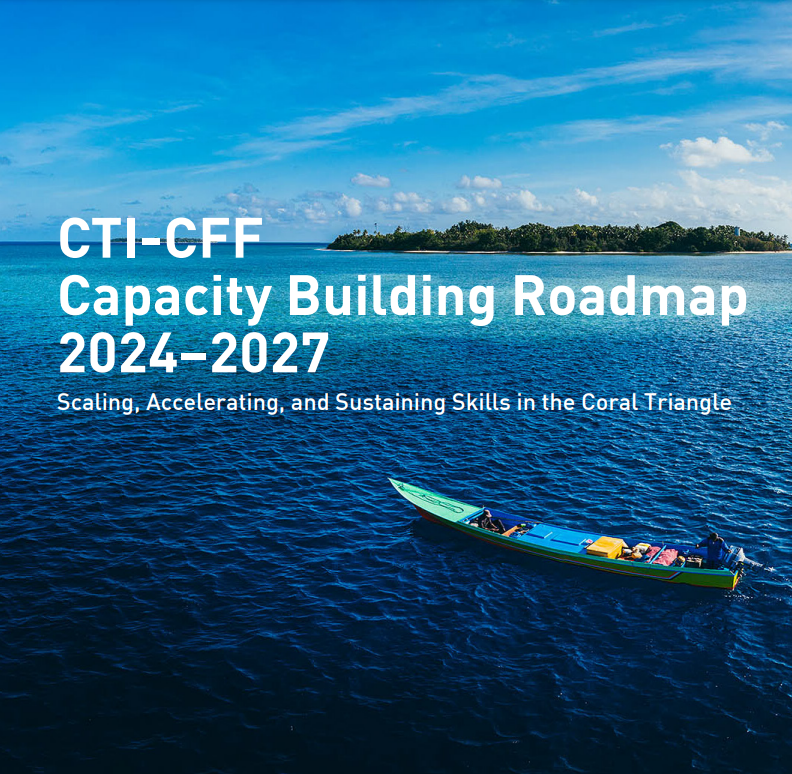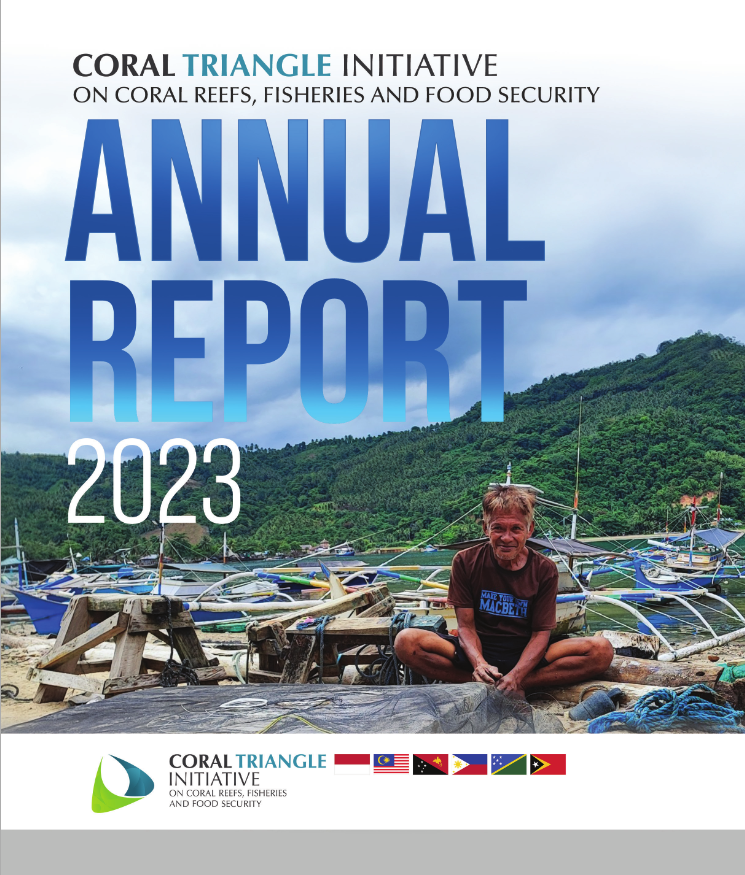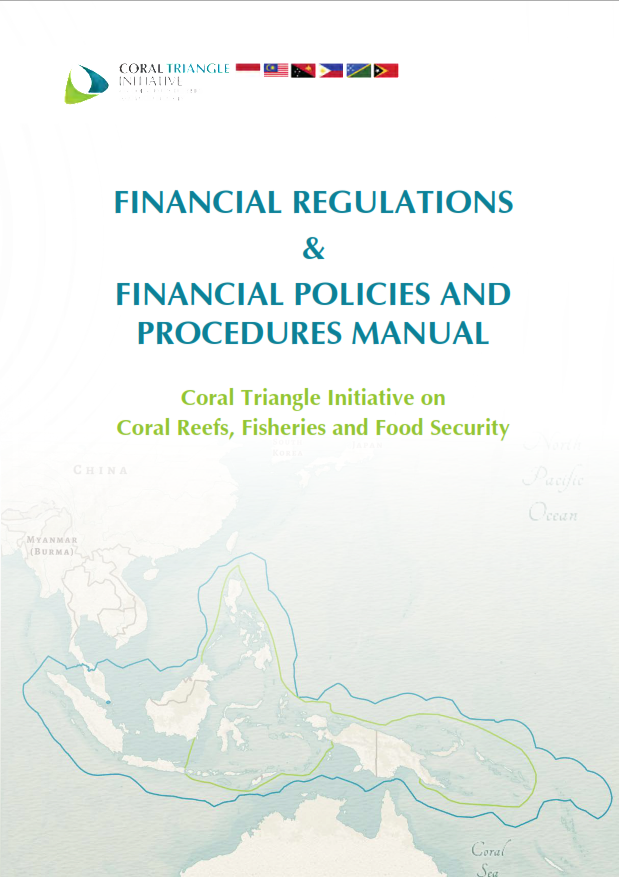Sustainable Marine Tourism in The Coral Triangle Marine Protected Areas System
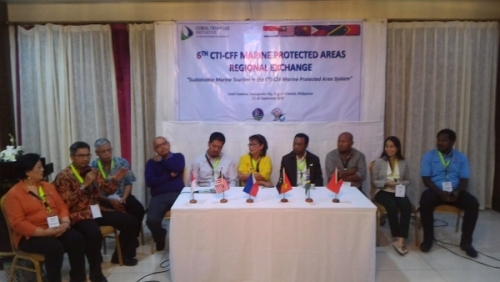
CT6 MPA Focal Points, RS and MPA Coordinator taken during the Press Conference
The Coral Triangle Initiative on Coral Reefs, Fisheries and Food Security (CTI-CFF) Marine Protected Area Technical Working Group (MPA-TWG) conducted the sixth MPA Regional Exchange on September 12-16, 2016 in Dumaguete City, Negros Oriental, Philippines. The theme of the workshop was focused on “Sustainable Marine Tourism in the CTI-CFF Marine Protected Areas System”. The Workshop was hosted by the Philippine National CTI-CFF Coordinating Committee (NCC) with funding support from the Department of Environment and Natural Resources (DENR, Philippines), CTI-CFF Regional Secretariat, GIZ and ADB RETA 7813, with technical support from the Coral Triangle Center (CTC), World Wildlife Fund for Nature (WWF), National Oceanic and Atmospheric Administration (US) (NOAA) and Sustainable Ecosystems Advanced (SEA-Project).
It was attended by around seventy six participants coming from the six CTI-CFF member countries (CT6), namely, Indonesia, Malaysia, Papua New Guinea (PNG), Philippines, Solomon Islands and Timor-Leste, including local government leaders from Siargao Island and Turtle Islands, Philippines, and from Raja Ampat, Indonesia, as well as the resource persons, observers and representatives from development partners.
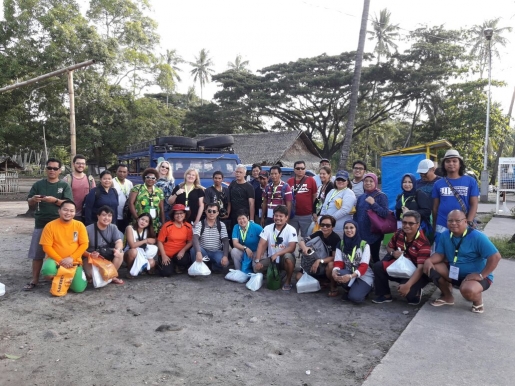
Group photo for the Apo Island Protected Landscape and Seascape study tour
The overall objective of the 5-day workshop was to introduce sustainable marine tourism in the Coral Triangle Region with the following specific objectives:
- To review the progress on the implementation of the Coral Triangle Marine Protected Area System Framework (CTMPAS nomination process, CT Atlas Training, Recognition of CTMPAS Sites);
- To review the implementation of the CT6 roadmap prepared in the previous Marine Protected Area Regional Exchange (MPA Rex 5);
- To review the status of MPA Management Effectiveness Assessment Tools in the CT6;
- To share concepts, knowledge and practices on Sustainable Tourism in MPAs that contribute to and build on the Coral Triangle MPA System;
- To review the draft Terms of Reference of the CTI-CFF Marine Tourism Task Force;
- To conduct a study tour to an MPA learning site on sustainable tourism in the Philippines; and
- Develop the Agenda for the 6th MPA Technical Working Group (MPA TWG) Meeting.
Generally, the workshop provided an opportunity for the participants to share their experiences on various aspects of MPA management and best practices on sustainable marine tourism through breakout group activities, open forum, plenary discussions, and a study tour at the nearby Dauin Network of MPAs and Apo Island Protected Landscape and Seascape. The study tour also provided the participants an opportunity to observe and interact with the communities to be able to gather information regarding successes, challenges and recommendations on sustainable marine tourism programs of the two learning sites, of which one is locally managed while the Apo Island PLS is under the national government.
The Result of the Workshop Include:
- Progress on the implementation of CT6 MPA roadmaps;
- Learnings on sustainable marine tourism;
- Updates on the result of the 1st and 2nd round of CTMPAS site nominations;
- Learnings on best practices from other countries on CTMPAS site selection and nomination;
- Road maps both in-country and regional for the 3rd round of CTMPAS nomination;
- CT6 focal points for the CT Atlas were designated and trained to update the CT Atlas MPA database;
- Priority activities for MPA management effectiveness monitoring;
- Updates on various MPA monitoring and evaluation tools developed and implemented in the CT region;
- Revised draft terms of reference of the Marine Tourism Task Force and their priority activities;
- Priority activities for the capacity needs on sustainable tourism;
- Short and long term sustainable tourism targets;
- Learnings on the concept of new CoralCloud platform on project preparation and financing mechanism;
- Provisional Agenda for the 6th MPA TWG Meeting; and
- Built/strengthened regional camaraderie among LGUs, MPA managers, NCC members, tourism enthusiasts, Regional Secretariat and Technical Advisers/Resource Persons.
The Major Recommendations Developed in the Workshop Include:
- Countries to continue to work hard for the implementation of the MPA roadmaps prepared during the 5th and 6th CTI-CFF MPA REX;
- Participants to present their country roadmaps for the 3rd round of CTMPAS site selection and nomination in 2017 to their respective NCCs for adoption and timely implementation;
- Implementation of the 3rd round of CTMPAS site selection and nomination;
- Nomination for CTMPAS sites should be streamed down to the site level;
- The MPA TWG to prepare a program for recognition of CTMPAS sites subject to the time and venue that will be agreed upon for implementation;
- Countries through their CT Atlas Focal Points to continue to update the CT Atlas MPA database;
- Countries to continue to develop, implement and refine the MPA monitoring and evaluation tools;
- Encourage the partners for the continued support for the MPA Coordinator;
- Apply/adopt the various concepts and learnings on sustainable marine tourism programs in the CT region;
- Continue to support the Sustainable Marine Tourism Task Force; and
- Raja Ampat as the possible venue for the succeeding MPA REX as offered by the Vice Mayor of Raja Ampat, Indonesia.

